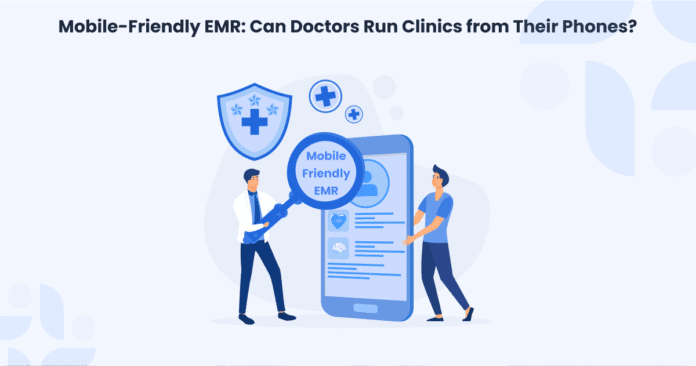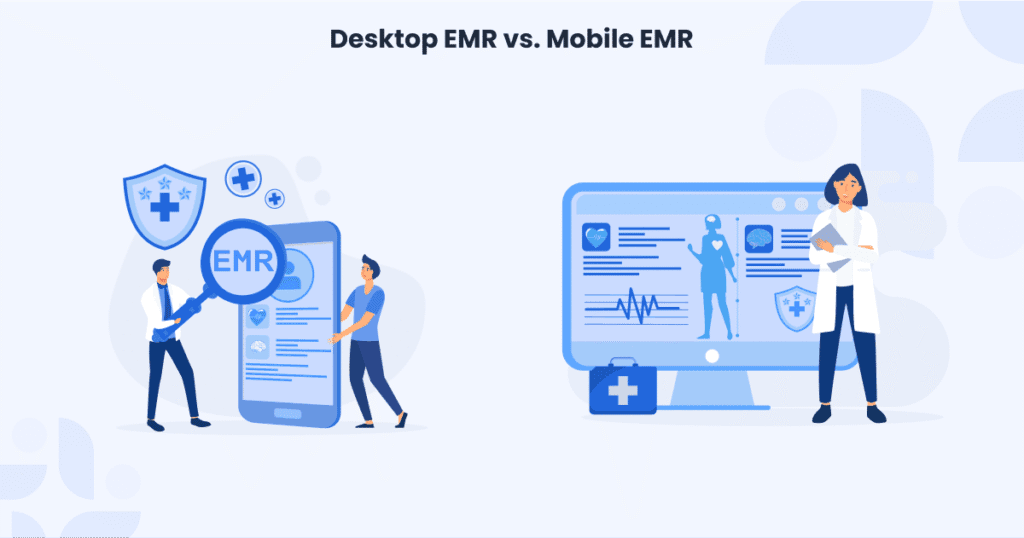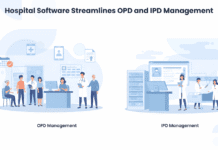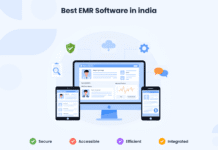
Running a clinic isn’t easy. Doctors spend a lot of time on paperwork. They see patients, keep records, schedule appointments, send prescriptions, and manage billing. Often, they spend more time on these tasks than on caring for patients. Traditionally, all of this meant desktops, piles of files, and constant back-and-forth with staff.
But what if you could handle all of it from your smartphone using a mobile EMR for doctors?
That’s exactly what mobile-friendly EMRs make possible. Today, doctors use their phones for more than just communication. They use them to run their clinics well and securely. Let’s examine how this works and why it changes the way healthcare delivers services.
Why Mobile EMRs Are Becoming Essential
Smartphones are not just for social media or emails anymore. They are also changing how doctors manage their clinics. With a mobile EMR for doctors, you can work from anywhere, not just your desk. From your phone, you can:
- Pull up patient records instantly
- Manage appointments with a doctor appointment scheduling app
- Send prescriptions directly through a digital prescriptions app
- Chat with your staff or patients
- Check lab results and follow up quickly
Basically, whether you’re between consultations or away from the clinic, you can keep everything under control without missing a beat.
What Is a Mobile-Friendly EMR?
A mobile-friendly EMR, or mobile EMR software in India, works well on your phone or tablet. It lets you do the same clinic tasks you would do on a desktop, but with more flexibility.
Here’s what it lets you do:
- Access Patient Records Instantly: Check medical history, lab results, and past treatments in seconds.
- Send Digital Prescriptions: Share prescriptions with pharmacies directly, no printing needed.
- Manage Appointments Easily: Schedule, confirm, or cancel appointments on the go.
- Handle Billing & Payments: Create invoices, track payments, and send reminders without missing a beat.
- Keep Data Safe: Patient information stays secure, encrypted, and compliant with regulations
In short, it’s everything you need to run your clinic, right from your phone. Healcard EMR is designed for mobile use. It gives doctors everything they need, from patient records to billing, in one easy app.
Running a Clinic From Your Phone: Is It Really Possible?
Yes. Modern mobile EMRs allow doctors to manage almost every aspect of a clinic from a smartphone. A typical day might look like this:
- Morning: Review today’s appointments and check patient history.
- During Consultations: Access records, write prescriptions, and update notes on the spot.
- Afternoon: Review lab results, send follow-up reminders, and communicate with staff.
- Evening: Generate bills, track payments, and review clinic performance.
Some clinics even use mobile health management EMRs for teleconsultations, letting doctors care for patients remotely.
Desktop EMR vs. Mobile EMR

When it comes to managing clinics, both desktop and mobile EMRs have their place, but they work very differently.
| Aspect | Desktop EMR | Mobile EMR |
| Accessibility | Tied to clinic desktops, limited mobility | Access anytime, anywhere on phone/tablet |
| Ease of Use | Full features, but often complex | Designed for quick, simple navigation |
| Updates | Manual or IT-supported updates | Automatic app updates via app stores |
| Flexibility | Best for fixed setups in one location | Perfect for doctors on the move |
| Patient Experience | Slower follow-ups, less real-time engagement | Faster communication, better engagement |
| Cost | Higher setup and maintenance costs | Usually subscription-based, lower upfront |
Desktop EMRs are good for large hospitals with IT teams and set workflows. However, mobile EMRs allow individual doctors and small clinics to manage their practice from anywhere. That’s why more doctors and small clinics are using mobile EMR. They are easier to use and cheaper, but still provide good patient care.
AI and Smart Features in Mobile EMRs
Many modern mobile EMRs for doctors are not just digital record-keeping tools; they’re smart assistants. They use AI to save time, reduce errors, and make daily work easier. Here are some common smart features:
| Feature | How It Helps |
| Diagnosis Suggestions | Provides likely diagnoses based on patient history |
| Drug Interaction Alerts | Prevents prescription mistakes |
| Automated Reminders | Ensures follow-ups and appointments aren’t missed |
| Data Analysis & Reports | Highlights trends and clinic performance |
| Teleconsultation Support | Enables remote consultations directly from the app |
| AI-Powered Insights | Suggests workflow improvements or efficiency tips |
These smart features in EMR systems help doctors make faster decisions and provide better care with less effort. Platforms like Healcard EMR are already using these AI-powered features to help doctors save time and reduce errors.
The Benefits of Using Mobile EMRs
Mobile EMRs for clinics aren’t just convenient; they can completely change how a clinic runs:
- Save time: Pull up patient records in seconds instead of rifling through files or juggling multiple systems.
- Work anywhere: Run your clinic from home, on the go, or even during short breaks.
- Give patients a better experience: Quicker appointments, smooth follow-ups, and simple communication make visits stress-free.
- Boost efficiency: Doctors and staff can coordinate easily, cutting down errors and confusion.
- Stay secure and compliant: Most mobile EMRs follow strict standards to protect patient data.
Cost vs. Benefit Analysis
Doctors often worry about the costs of switching to a mobile EMR. Here’s a simple breakdown:
| Cost | Benefit |
| Subscription/license fees | Saves hours on administrative tasks |
| Training and setup time | Reduces errors and improves patient care |
| Hardware or device upgrades | Manage the clinic anywhere, anytime |
| Initial workflow disruption | Better coordination among staff |
| Internet/data expenses | Faster decision-making and patient follow-ups |
| Maintenance & support | Long-term efficiency and smoother operations |
In many cases, the long-term benefits are much greater than the initial cost. This makes mobile EMR software a smart choice for clinics in India. They can easily see the cost versus the benefits of using mobile EMR.
Tips for Smooth Mobile EMR Adoption
Switching to the best mobile EMR app for doctors can actually be pretty straightforward if you take it step by step:
- Train your team: Make sure everyone knows how to use the app without getting confused.
- Take it slow: Start with the basics and only move to the advanced features once everyone is comfortable.
- Back up your data: Keep patient records safe so nothing gets lost.
- Watch how it’s used: Check how the app is being used and fix any issues that come up.
- Ask for feedback: Talk to your doctors, staff, and patients to see what’s working and what isn’t.
Challenges to Keep in Mind
Mobile EMRs for doctors are powerful, but a few things matter:
- Security: Patient data must be safe and encrypted.
- Internet: Many EMRs need a connection, though some can work offline.
- Training: Doctors and staff will need a bit of time to get used to it.
- Device Limits: Smaller screens can make certain tasks slower than on a desktop.
Even with these challenges, the flexibility and smoother workflows of mobile EMRs usually make them worth it.
Choosing the Right Mobile EMR
Here’s the simple way to think about it:
- Easy to Use: The app should be straightforward, with no steep learning curve. You shouldn’t need a manual for every click.
- Works Offline: Even if the internet is spotty, you should still be able to access patient records and write notes.
- Plays Well with Others: It should connect easily with labs, pharmacies, and insurance systems so everything flows smoothly.
- Safe and Compliant: Patient data is sensitive. Make sure the app follows all healthcare privacy and security rules.
- Support When You Need It: The company should help you get started and be there if issues come up.
If you want an easy-to-use and secure mobile EMR for clinics, consider Healcard EMR
FAQs About Mobile-Friendly EMR
A mobile-friendly EMR lets doctors run their clinic from a phone or tablet, check records, send prescriptions, manage appointments, handle billing, and keep data safe, all in one app.
Key features: patient records, digital prescriptions, scheduling, billing, lab integration, and strong data security.
Some apps have an offline mode for basic tasks, but most functions need connectivity.
Yes, if you choose one with encryption, authentication, and compliance with healthcare regulations.
Usually subscription-based. While there are setup costs, the time saved and smoother workflows make it worth it.
Yes. Modern mobile EMRs are cloud-based and just as reliable as desktops, with added flexibility to work anywhere.
A stable 5G or Wi-Fi connection is usually enough. Some apps even have offline modes for emergencies.
Your data is safe if the EMR uses encryption, secure logins, and remote logout features. Always enable two-factor authentication.
Not usually. Most are optimized for mobile use. Heavy use (video consults, large file uploads) may affect battery, but it is manageable.
Yes, many small and mid-sized clinics run entirely on mobile EMRs. Larger hospitals often use a mix of both.
Most leading EMRs sync across devices. You can use a desktop in the clinic and a mobile when you’re away; data stays updated.
Summary:
Mobile-friendly EMRs allow doctors to manage their clinics using a smartphone. They can handle patient records, appointments, prescriptions, billing, and teleconsultations. Smart features like AI suggestions, reminders, and workflow insights help clinics save time, reduce errors, and work more efficiently. Choosing the right mobile EMR makes running your practice smoother, more flexible, and better for patients. Healcard is a great example of top mobile EMR software. It is a mobile-first solution that brings benefits to daily clinic life. It is secure, easy to use, and made for doctors who want freedom without compromise.
Need help? Contact us at support@healcard.com




